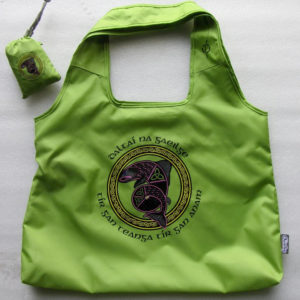It is hard to whistle and eat at the same time.
Note: Every year on the fourth Thursday in November people in the United States of America, wherever they may live, gather their clans together for a great feast, called Thanksgiving. It celebrates the first harvest of the Puritans in the New World. Traditionally, a large turkey is roasted and eaten along with potatoes, turnips, carrots, onions, and other garden delicacies. After dinner, it is customary for the family to root for their favorite American football team. A snack during the game is not unusual. Those who snack during the game would do well to keep this proverb in mind.
Of course, this week’s seanfhocal is actually to remind you that you can not do two things at once. Perhaps, the more widely known version of this seanfhocal is “Ní féidir le aon duine a bheith ag feadaíl agus ag ithe mine.” (One can’t whistle and drink at the same time.) However, this version comes from the West of Ireland, where, apparently, people are more confident of their capabilities. It may be hard to whistle and eat simultaneously, but it is not impossible for someone from the West.
Note also: The genitive case is used after a verbal noun, i.e., “ag ithe mine”. The word ‘mine’ is the genitive singular of ‘min,’ the word for ‘meal’ as in corn meal (min bhuí), oatmeal (min choirce), wheatmeal (min chruithneachta), barley meal (min eorna), rye-meal (min seagail). So, literally, this seanfhocal translates “It is hard to be whistling and eating meal.” There are three verbal nouns in this proverb, ‘bheith’ (be), ‘feadaíl’ (whistle), and ‘ithe’ (eat). Put the preposition ‘ag’ in front of a verbal noun and it becomes a gerund, e.g., ‘ag feadaíl’ (whistling), ‘ag ithe’ (eating). In any case, a verbal noun acts like a noun. So whether it is two nouns, e.g., ‘min choirce’ (literally, ‘meal of oats’) or a verbal noun and another noun, ‘ag ithe mine’ (literally, ‘eating of meal’), the modifying noun must be in the genitive case.
